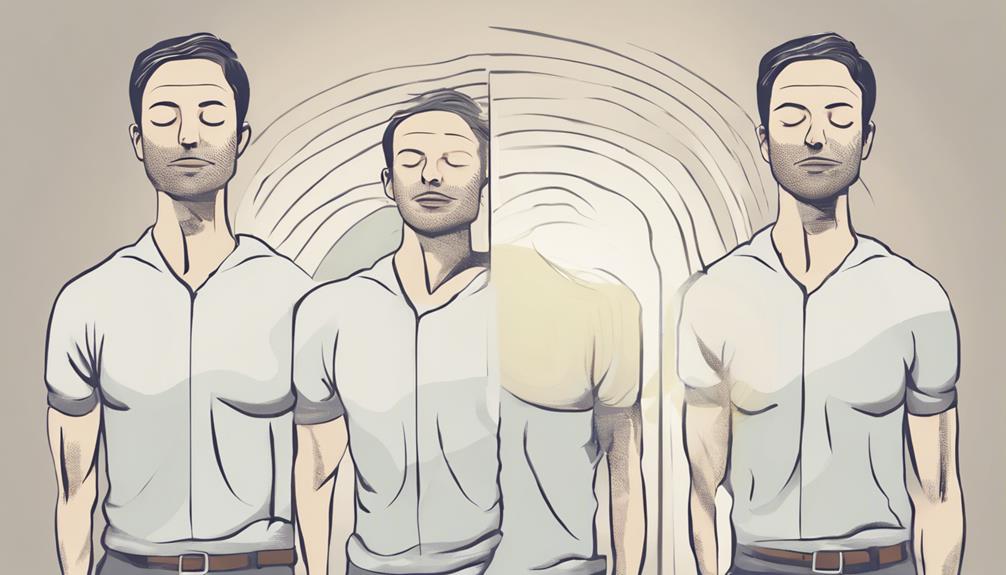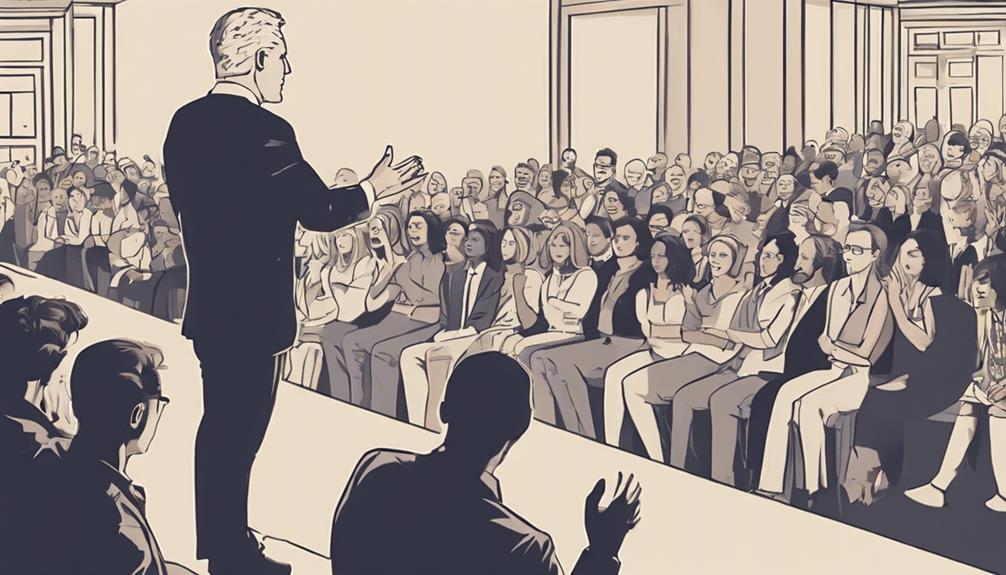Utilizing social-cognitive theories in hypnosis provides a structured approach to understanding beliefs, social influences, self-efficacy, observational learning, and cognitive factors. Beliefs greatly shape responses to hypnotic suggestions, while observing others and building self-efficacy can enhance hypnotic success. Social modeling and cognitive mechanisms also play crucial roles in shaping hypnotizability levels. By delving further into these theories, practitioners can optimize therapeutic interventions and improve outcomes for individuals undergoing hypnosis.
Role of Beliefs in Hypnosis

The role of beliefs in hypnosis plays a significant part in shaping individuals' responses to hypnotic suggestions and their overall hypnotic experience. Belief formation is a crucial aspect of hypnotic suggestibility, influencing how receptive individuals are to hypnosis and the extent to which they can experience hypnotic phenomena.
Research has shown that individuals with strong beliefs in the efficacy of hypnosis are more likely to respond positively to hypnotic suggestions and exhibit a greater hypnotic response. Moreover, beliefs can also contribute to attitude change during hypnosis. As individuals engage in hypnosis, their beliefs about themselves, their capabilities, and the hypnotic process can undergo transformation.
This change in attitude can lead to a more profound hypnotic experience and greater responsiveness to hypnotic suggestions. By understanding the role of beliefs in hypnosis, practitioners can tailor their approach to enhance individuals' hypnotic responsiveness and optimize the therapeutic outcomes of hypnosis sessions.
Influence of Social Modeling
An examination of the influence of social modeling on hypnotic suggestibility reveals the significant impact of observing others' responses to hypnosis on an individual's own susceptibility to hypnotic suggestions. Peer influence plays a crucial role in shaping an individual's responsiveness to hypnosis. When individuals witness their peers displaying high levels of suggestibility during a hypnotic session, they may be more inclined to mimic similar behaviors, thereby increasing their own susceptibility to hypnotic suggestions.
Group dynamics also come into play, as the collective behavior of a group undergoing hypnosis can create a social norm that influences each individual's response to suggestions.
Moreover, social norms and conformity play a significant role in the influence of social modeling on hypnotic suggestibility. Individuals may conform to the behaviors and responses of others in a group setting, leading to increased suggestibility as they align their experiences with the perceived norms within the group.
Self-Efficacy in Hypnotic Response

Self-efficacy, as a key psychological construct, plays a pivotal role in determining an individual's responsiveness to hypnotic suggestions. Self-efficacy refers to one's belief in their ability to successfully perform a particular task or achieve desired outcomes. In the context of hypnosis, individuals with higher self-efficacy are more likely to respond positively to hypnotic suggestions and experience greater hypnotic success.
Confidence building techniques can significantly impact an individual's self-efficacy levels in relation to hypnosis. By incorporating techniques such as positive affirmations, visualization exercises, and gradual exposure to hypnotic suggestions, practitioners can help enhance their clients' confidence in their ability to enter a hypnotic state and respond effectively to suggestions.
Moreover, individuals with high performance expectations regarding their hypnotic abilities are more likely to achieve positive outcomes during hypnosis. Setting realistic yet optimistic performance expectations can further boost self-efficacy and contribute to overall hypnotic success.
Observational Learning in Hypnosis
Observational learning, a core component of social-cognitive theories, plays a significant role in shaping individuals' responses to hypnotic suggestions and their overall engagement with the hypnotic process.
Through observation, individuals may acquire new behaviors or responses by witnessing others' experiences during hypnosis. This process can lead to imitation effects, where individuals replicate behaviors or responses they have observed in others during hypnotic sessions.
Mirror neurons, a key component of observational learning, are believed to contribute to individuals' ability to mimic behaviors they witness. In the context of hypnosis, mirror neurons may play a role in the transmission of suggestibility levels from the hypnotist to the individual undergoing hypnosis.
This neural mechanism could explain why some individuals exhibit higher levels of suggestibility during hypnosis after observing others responding in a similar manner.
Understanding the influence of observational learning on hypnotic learning and suggestibility levels is essential for enhancing the effectiveness of hypnotic interventions and tailoring hypnotic techniques to individual needs.
Cognitive Factors in Hypnotizability

Empirical studies have identified various cognitive factors that significantly influence individual differences in hypnotizability levels. Cognitive processing plays a crucial role in determining an individual's susceptibility to hypnosis. Those with high levels of suggestibility tend to respond more effectively to hypnotic suggestions, showcasing a fundamental cognitive factor in hypnotizability.
Furthermore, attentional focus is another key aspect in understanding hypnotic susceptibility. Individuals who can maintain a heightened level of attention and focus during hypnotic induction are more likely to achieve deeper hypnotic states, indicating a strong correlation between attentional focus and hypnotizability.
Research suggests that cognitive factors such as suggestibility and attentional focus interact to shape an individual's responsiveness to hypnosis. By considering these cognitive mechanisms, practitioners can tailor hypnotic interventions to suit the unique cognitive profiles of their clients, ultimately enhancing the effectiveness of hypnotherapy.
Understanding these cognitive factors in hypnotizability provides valuable insights into optimizing the use of hypnosis as a therapeutic tool.
Social-Cognitive Approaches in Practice
In the application of hypnosis, incorporating social-cognitive approaches into practice can offer a comprehensive understanding of how interpersonal dynamics and cognitive processes influence hypnotic experiences.
Group dynamics play a crucial role in hypnosis sessions, as individuals within a group setting may influence each other's responses to suggestions.
Social influence, another key component, highlights how an individual's susceptibility to hypnosis can be shaped by the presence and actions of others.
Understanding these social-cognitive aspects allows practitioners to tailor their approach based on the dynamics present in a given session.
Frequently Asked Questions
Can Hypnosis Be Used to Erase Memories?
Memory manipulation through hypnosis raises ethical concerns due to potential impacts on individuals' autonomy and well-being. The efficacy and ethicality of erasing memories through hypnosis remain debatable, requiring careful consideration of ethical guidelines and psychological implications.
Does Age Affect Hypnotic Susceptibility?
Age can influence hypnotic susceptibility, with older individuals often exhibiting higher suggestibility. Gender differences may also play a role, as well as cultural influences impacting how individuals respond to hypnosis. These factors highlight the complexity of hypnotic responsiveness.
How Long Does a Hypnotic Suggestion Last?
The duration of a hypnotic suggestion's effectiveness varies based on individual hypnotic suggestibility and the presence of hypnotic reinforcement. Factors such as depth of trance, post-hypnotic suggestions, and the suggestibility of the subject contribute to the longevity of hypnotic effects.
Can Self-Hypnosis Be Dangerous?
Self-hypnosis can pose potential risks if practiced without proper knowledge or guidance. It may lead to unintended psychological consequences or false memories. Ethical considerations include ensuring individuals have the capacity to engage in self-hypnosis safely and responsibly.
Are There Risks of Addiction to Hypnosis?
Addiction risks in hypnosis are minimal when conducted by trained professionals. However, excessive reliance on hypnosis can potentially lead to psychological dependency. Long term effects may include decreased self-efficacy and reliance on external sources for coping mechanisms.
Conclusion
In conclusion, the utilization of social-cognitive theories in hypnosis offers valuable insights into the role of beliefs, social modeling, self-efficacy, observational learning, and cognitive factors in hypnotic response.
By integrating these approaches into practice, clinicians can enhance their understanding of hypnotizability and improve the effectiveness of hypnosis interventions.
Further research and application of social-cognitive theories in hypnosis may lead to advancements in the field and better outcomes for individuals seeking hypnotherapy.


